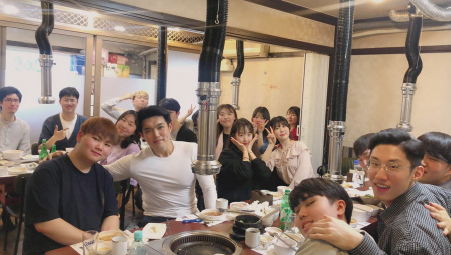
In June 2019, my term ends as the Editor-in-Chief at The UOS Times. The total number of members of The UOS Times is now 20, including two executive members. Many seniors told me that The UOS Times has made unprecedented progress, compared to the past when there were only about 10 reporters in our organization. However, I could not merely accept such comments as they are meant. It sometimes felt burdensome to manage and supervise 19 reporters. This burden, in turn, forced me to believe that I had to “educate” 19 people and “control” the whole group. However, there was a thing I totally overlooked, and that was, that all of our members are “competent.”
One day, I was busy editing all of the articles to publish a magazine until I received a call which completely put me in shock. It was from one of our reporters, and they said they were hurt and upset because of my behaviors. After the call, I stopped editing and started to ponder my past as a leader. I chewed the cud again and again until I finally concluded, I have behaved too strictly and ruthlessly to the reporters. Then, I raised a question for myself: “Why have I behaved in such way to them?” Well, four words sparked my brain: “I am a leader.” But ever since I started assuming this position, I have become a “dictator,” not a leader, of The UOS Times.
This was largely due to the main fallacy I had that I was superior to all others, and I knew everything about them and the organization. This dangerous thought eventually resulted in disregard for the reporters’ opinions. As I concluded this question, I really thanked the reporter who let me realize my fault by telling me about it as soon as possible. If not, I would still be managing the press as a “dictator.” Ever since then, I have tried to respect the reporters’ opinions and accept their requests and demands if there are any. Fortunately, it worked out well and the atmosphere of The UOS Times has been getting better. Also, the burden that I had pressured myself with also has gotten lessened.

Now, as for the 151st issue of the magazine, I would like to introduce the topics of each feature. In Cover Story, two reporters tackle the present condition of internationalization of the University of Seoul (UOS). There are also two society features dealing with domestic and international issues. In addition, The UOS Times deals with the Yongsan Incident: a naked face of urban renewal, and an explanatory feature of Brexit, respectively. Also, six new cub reporters introduce the Rabbit Foot, a start-up preparation club at UOS, and three school promoting organizations.
I used to tell my friends how I am lucky that I always have such nice people around me. I was very happy and I believe it was worthwhile to work with 19 reporters in this organization. I just feel sorry for what I have done in the way, and appreciate that everyone still followed the lead of the blunt Editor-in-Chief nonetheless. I would still cheer for The UOS Times and the reporters even after my retirement.
Kim Jung-gon
Editor-in-Chief
kjgydp1006@uos.ac.kr

